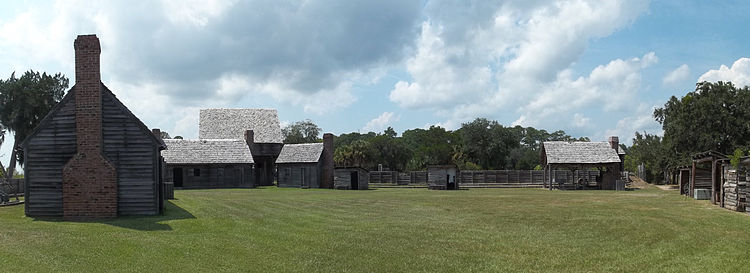Portal:Georgia (U.S. state)
The Georgia (U.S. state) PortalGeorgia /ˈdʒɔːrdʒə/ is a state located in the southeastern United States. It was established in 1732, the last of the original Thirteen Colonies. Named after King George II of Great Britain, Georgia was the fourth state to ratify the United States Constitution, on January 2, 1788. It declared its secession from the Union on January 21, 1861, and was one of the original seven Confederate states. It was the last state to be restored to the Union, on July 15, 1870. Georgia is the 24th most extensive and the 8th most populous of the 50 United States. From 2007 to 2008, 14 of Georgia's counties ranked among the nation's 100 fastest-growing, second only to Texas. Georgia is known as the Peach State and the Empire State of the South. Atlanta is the state's capital and its most populous city. Georgia is bordered on the south by Florida; on the east by the Atlantic Ocean and South Carolina; on the west by Alabama; and on the north by Tennessee and North Carolina. The northern part of the state is in the Blue Ridge Mountains, a mountain range in the vast Appalachian Mountains system. The central piedmont extends from the foothills to the fall line, where the rivers cascade down in elevation to the continental coastal plain of the southern part of the state. The highest point in Georgia is Brasstown Bald, 4,784 feet (1,458 m); the lowest point is the Atlantic Ocean. Georgia is the most extensive state east of the Mississippi River in terms of land area, although it is the fourth most extensive (after Michigan, Florida, and Wisconsin) in total area, a term which includes expanses of water which are part of state territory.
Selected article -The Battle of Atlanta was a battle of the Atlanta Campaign fought during the American Civil War on July 22, 1864, just southeast of Atlanta. Continuing their summer campaign to seize the important rail and supply center of Atlanta, Union forces commanded by William T. Sherman overwhelmed and defeated Confederate forces defending the city under John B. Hood. Union Maj. Gen. James B. McPherson was killed during the battle. Despite the implication of finality in its name, the battle occurred midway through the campaign and the city did not fall until September 2, 1864, after a Union siege and various attempts to seize railroads and supply lines leading to Atlanta. After taking the city, Sherman's troops headed south-southeastward toward Milledgeville, the State capital, and on to Savannah with the March to the Sea. The fall of Atlanta was especially noteworthy for its political ramifications. In the 1864 election, former Union General George B. McClellan, a Democrat, ran against President Lincoln on a peace platform calling for truce with the Confederacy. The capture of Atlanta and Hood's burning of military facilities as he evacuated were extensively covered by Northern newspapers, significantly boosting Northern morale, and Lincoln was reelected by a large margin. Selected picture - Credit: Maksim Sundukov
The Concourse at Landmark Center is a real estate development in metro Atlanta's Perimeter Center business district, in the city of Sandy Springs, Georgia, United States. It is a 70 acre planned community with two 34-story office towers, several low-rise office buildings, a hotel, and a health club, all set in landscaped grounds around a man-made lake. State facts
State symbols:
Selected biography -Jackie Robinson (1919–1972) was the first African-American Major League Baseball (MLB) player of the modern era. Robinson broke the baseball color line when he debuted with the Brooklyn Dodgers in 1947. As the first black man to openly play in the major leagues since the 1880s, he was instrumental in bringing an end to racial segregation in professional baseball, which had relegated African-Americans to the Negro leagues for six decades. The example of his character and unquestionable talent challenged the traditional basis of segregation, which then marked many other aspects of American life, and contributed significantly to the Civil Rights Movement. Apart from his cultural impact, Robinson had an exceptional baseball career. Over ten seasons, he played in six World Series and contributed to the Dodgers' 1955 World Championship. He was selected for six consecutive All-Star Games from 1949 to 1954, was the recipient of the inaugural MLB Rookie of the Year Award in 1947, and won the National League Most Valuable Player Award in 1949 – the first black player so honored. Robinson was inducted into the Baseball Hall of Fame in 1962. In 1997, Major League Baseball retired his uniform number, 42, across all major league teams. In recognition of his achievements on and off the field, Robinson was posthumously awarded the Presidential Medal of Freedom and the Congressional Gold Medal. Selected anniversaries for June
Did you know -
CategoriesSelect [►] to view subcategories
WikiProjects
What are WikiProjects? Selected panoramaCredit: Ebyabe
Fort King George was a fort located in the U.S. state of Georgia. The fort was built in 1721 along the Altamaha River and served as the southernmost outpost of the British Empire in the Americas until 1727. The fort was constructed in what was then considered part of the colony of South Carolina, but was territory later settled as Georgia. It was part of a defensive line intended to encourage settlement along the colony's southern frontier, from the Savannah River to the Altamaha River. Great Britain, France, and Spain were competing to control the American Southeast, especially the Savannah-Altamaha River region. Selected quoteQuality content
Featured articles
Featured lists
Featured pictures
TopicsThings you can doedit · history · watch · purge Related portalsAssociated WikimediaThe following Wikimedia Foundation sister projects provide more on this subject:
Discover Wikipedia using portals |





























